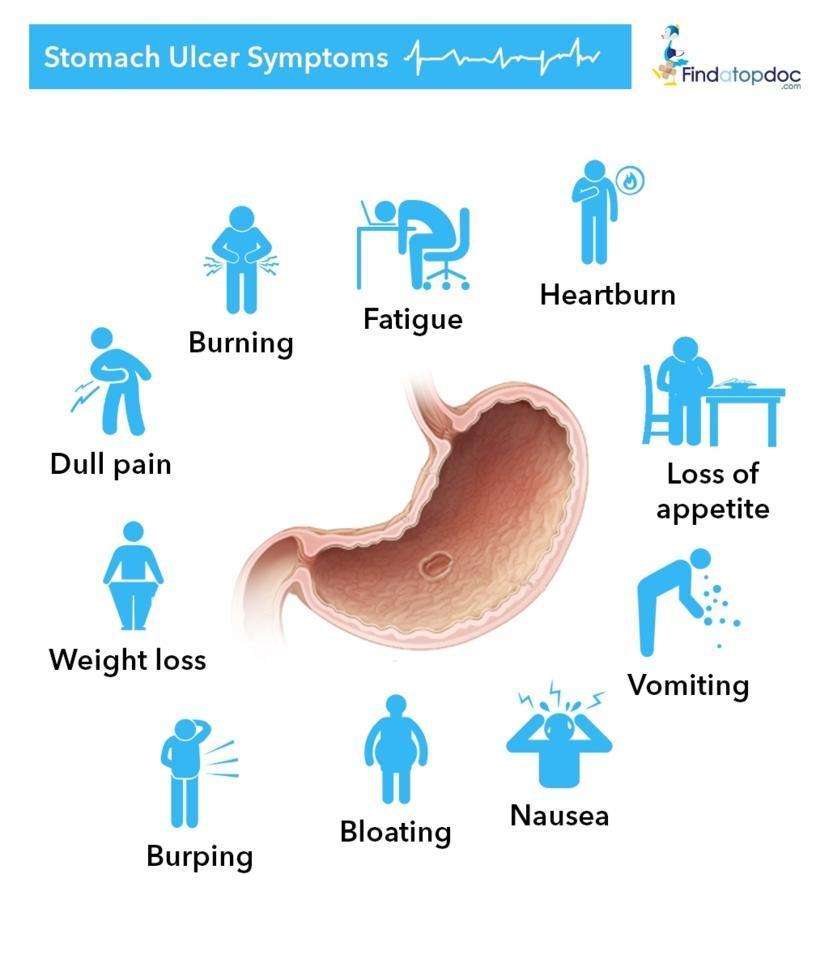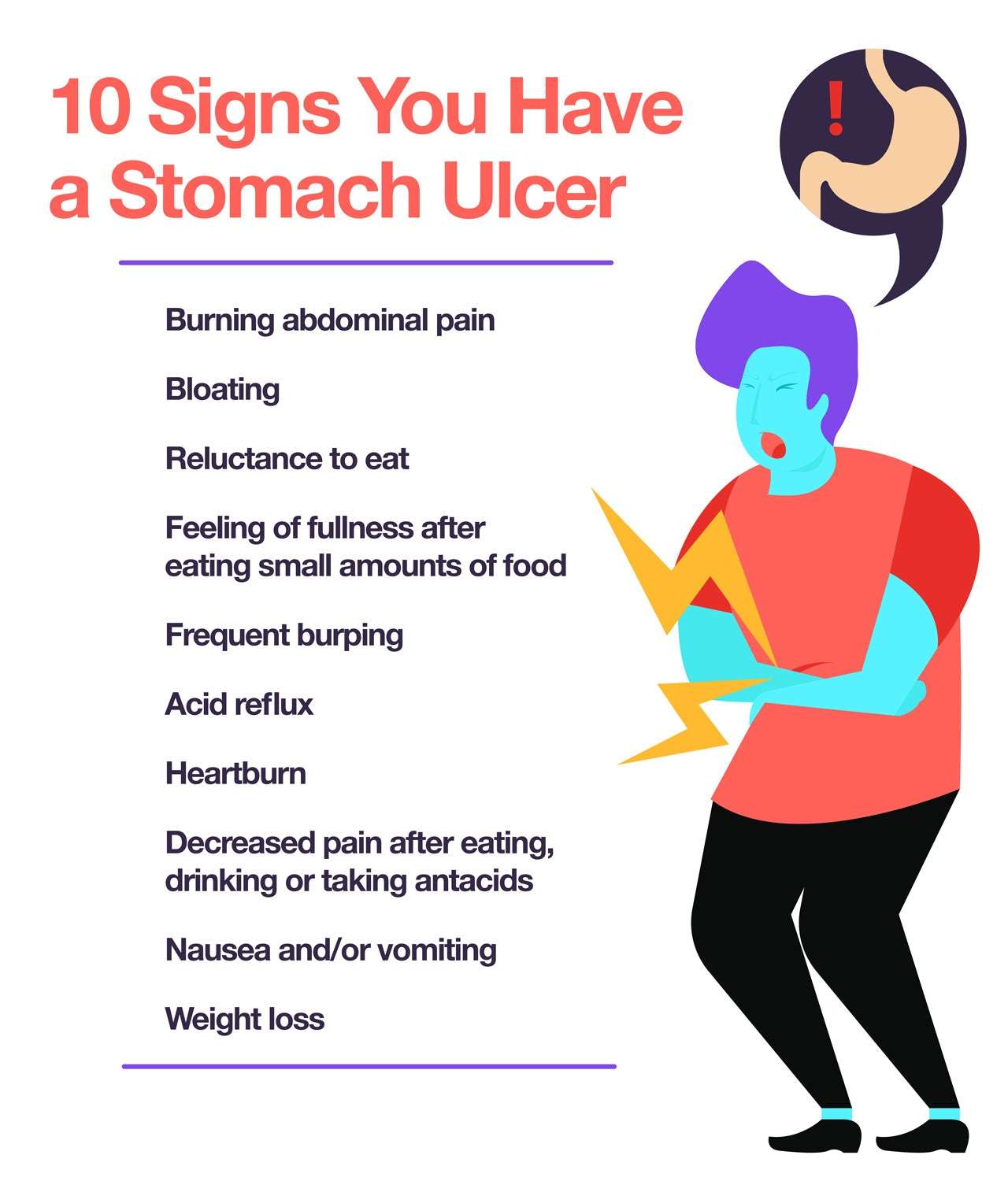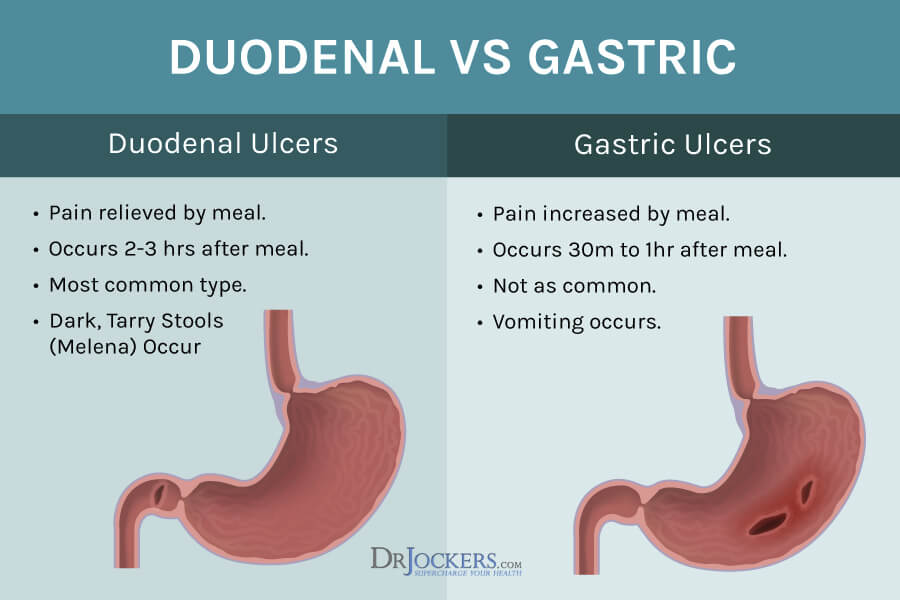How Are Peptic Ulcers Treated
Treatment will depend on the type of ulcer you have. Your healthcare provider will create a care plan for you based on what is causing your ulcer.
Treatment can include making lifestyle changes, taking medicines, or in some cases having surgery.
Lifestyle changes may include:
- Not eating certain foods. Avoid any foods that make your symptoms worse.
- Quitting smoking. Smoking can keep your ulcer from healing. It is also linked to ulcers coming back after treatment.
- Limiting alcohol and caffeine. They can make your symptoms worse.
- Not using NSAIDs . These include aspirin and ibuprofen.
Medicines to treat ulcers may include:
- Antibiotics. These bacteria-fighting medicines are used to kill the H. pylori bacteria. Often a mix of antibiotics and other medicines is used to cure the ulcer and get rid of the infection.
- H2-blockers . These reduce the amount of acid your stomach makes by blocking the hormone histamine. Histamine helps to make acid.
- Proton pump inhibitors or PPIs. These lower stomach acid levels and protect the lining of your stomach and duodenum.
- Mucosal protective agents. These medicines protect the stomach’s mucus lining from acid damage so that it can heal.
- Antacids. These quickly weaken or neutralize stomach acid to ease your symptoms.
In most cases, medicines can heal ulcers quickly. Once the H. pylori bacteria is removed, most ulcers do not come back.
Other Causes And Factors
Other causes are rare. For example, some viral infections can cause a stomach ulcer. Crohn’s disease may cause a stomach ulcer in addition to other problems of the gut.
Stomach cancer may at first look similar to an ulcer. Stomach cancer is uncommon but may need to be ‘ruled out’ if you are found to have a stomach ulcer.
Gallstones And Hiatal Hernia
Often people who have symptomatic gallstones experience belching along with gas, nausea, a decrease in appetite, and abdominal pain.15 Additionally, a few people with a hiatal hernia might experience excessive burping.
Remedy: Symptomatic gallstones are often treated with the help of surgery, so be sure to talk to a professional regarding that. A hiatal hernia, meanwhile, requires you to avoid heavy meals and take medications that regulate stomach acid and esophageal muscle strength.16
Recommended Reading: How To Stop Ulcerative Colitis Pain
Causes Of Stomach Ulcers
Stomach ulcers occur when the layer that protects the stomach lining from stomach acid breaks down. This means the stomach lining becomes damaged.
This is usually a result of:
- an infection with Helicobacter pylori bacteria
- taking non-steroidal anti-inflammatory drugs , such as ibuprofen or aspirin particularly if they’re taken for a long time or at high doses
It used to be thought that stress or certain foods might cause stomach ulcers, but there’s little evidence to suggest this is the case.
How Do I Know If I Have An Ulcer Or Acid Reflux

Heartburn– Another symptom of peptic ulcers is heartburn. Heartburn is a condition that’s caused when stomach acid flows up into your esophagus. This leads to a burning discomfort below your breastbone or in your upper belly. Your doctor will prescribe medications to relieve your symptoms and help your ulcer heal.
Also Check: Stomach Ulcer Treatment In Homeopathy
How Are Ulcers Treated
Some mild cases of ulcers may not need medical attention as they will heal on their own. However, not seeking proper medical treatment may result in these ulcers coming back.
Antibioticsare normally prescribed to eliminate the infection, and sometimes an acidreducer. They may be prescribed to be taken twice a day for 1 to 2 weeks.
If NSAIDs are causing the ulcers, a doctor may prescribe a protective medication to take along with it.
Dont Miss: How To Cure Tongue Ulcer
Can I Do Anything Else To Avoid Dyspepsia
Yes, for example:
If you smoke, stop smoking.
If some foods bother your stomach, try not to eat them.
Try to reduce the stress in your life.
If you have acid reflux, don’t eat right before bedtime. Raising the head of your bed with blocks under two legs may also help.
Unless your doctor tells you otherwise, don’t take a lot of anti-inflammatory medicines like ibuprofen , aspirin, naproxen , and ketoprofen . Acetaminophen is a better choice for pain, because it won’t hurt your stomach.
Read the full article.
- Get immediate access, anytime, anywhere.
- Choose a single article, issue, or full-access subscription.
- Earn up to 6 CME credits per issue.
Read Also: Medication For Ulcerative Colitis Flare Up
How To Prevent Ulcers
Be careful when taking pain relievers.
Patients suffering from arthritis and other medical conditions which cause chronic pain, often take non-steroidal anti-inflammatory drugs or NSAIDs for months and weeks to alleviate the swelling and pain. These pain relievers can have a negative effect on the mucus which protects your stomach from acid, increasing your chances of developing peptic ulcers.
These pain relievers include:
- Aspirin
- Naproxen sodium
To lower the chances of developing peptic ulcers while taking NSAIDs, it is advisable to take the lowest possible dose to ease your symptoms. Take your medication with food and stop taking it as soon as you dont need it. It is also advisable to avoid drinking alcohol while taking these medications.
When Should I See A Doctor If I Think I Have A Peptic Ulcer
- If you have burning pain in your upper stomach that is relieved by eating or taking antacids, call a health-care professional for an appointment. Dont assume you have an ulcer. Certain other conditions can cause similar symptoms.
- If you vomit blood or have other signs of gastrointestinal bleeding, go to an emergency department right away. Peptic ulcers can cause massive bleeding, which requires blood transfusion or surgery.
- Severe abdominal pain suggests perforation or tearing of an ulcer. This is an emergency that may require surgery to fix a hole in your stomach.
- Vomiting and abdominal pain also can be a sign of an obstruction, another complication of peptic ulcers. This also may require emergency surgery.
Read Also: Boost Vs Ensure Ulcerative Colitis
You May Like: Best Protein For Ulcerative Colitis
Peptic Ulcer Facts And Picture
- Peptic ulcer are sores in the lining of the esophagus, stomach or duodenum.
- The main symptom of a stomach or duodenal ulcer is upper abdominal pain, which can be dull, sharp, or burning .
- Other associated symptoms may include:
- Acid reflux or heartburn
- Feeling satiated when eating
H Pylori Infection And Giardiasis
Burping may be a symptom of a Helicobacter pylori infection or giardiasis. An H. pylori infection often results in stomach ulcers, also called peptic ulcers. Excessive burping is a symptom, though not the only symptom. Usually, a gnawing pain due to the ulcer is what characterizes such an infection. Giardiasis is an infection of the small intestine, caused by a water-borne parasite called giardia lamblia, and symptoms include gas, bloating, and burping.
Remedy: Both infections require treatment with antibiotics and should not be neglected.
You May Like: Is Honey Good For Ulcerative Colitis
Treating Helicobacter Pylori Infection
If your stomach ulcer’s caused by a Helicobacter pylori bacterial infection, you’ll be given:
- a course of antibiotics
- a medication called a proton pump inhibitor
This is also recommended if it’s thought your stomach ulcer’s caused by a combination of an H. pylori infection and non-steroidal anti-inflammatory drugs .
Symptoms Of Peptic Ulcer Disease

The most common symptom is a burning pain in your stomach. It usually lasts for a few minutes to a few hours. It comes and goes for days or weeks at a time. The burning typically occurs between meals and at night. Small ulcers may cause no symptoms.
Other symptoms can include:
- Difficulty drinking as much liquid as usual
- Hunger or an empty feeling in your stomach after you eat
- Mild nausea
- Stomach pain that wakes you up at night
Less common symptoms include:
- Bleeding
- Perforation
- Peritonitis
Don’t Miss: Best Supplement For Gastric Ulcers In Horses
How Do Nsaids Cause A Peptic Ulcer
To understand how NSAIDs cause peptic ulcer disease, it is important to understand how NSAIDs work. Nonsteroidal anti-inflammatory drugs reduce pain, fever, and inflammation, or swelling.
Everyone has two enzymes that produce chemicals in your bodys cells that promote pain, inflammation, and fever. NSAIDs work by blocking or reducing the amount of these enzymes that your body makes. However, one of the enzymes also produces another type of chemical that protects the stomach lining from stomach acid and helps control bleeding. When NSAIDs block or reduce the amount of this enzyme in your body, they also increase your chance of developing a peptic ulcer.
Nsaid Drugs And Stomach Ulcers
A group of painkillers known as NSAIDs carries a risk of stomach ulcers. The two best-known NSAIDs are aspirin and ibuprofen.
The risk of ulcers increases if the drugs are taken in high doses, or regularly for a long time.
Stronger NSAIDs, such as those that need a prescription, are riskier for stomach ulcers than those that can be bought over-the-counter .
People should always check labels and talk to a pharmacist or a doctor about any concerns with using painkillers. They may recommend an alternative such as acetaminophen.
Also Check: What To Do When You Have A Stomach Ulcer
How Can I Be Sure Its An Ulcer
The only way to be sure an ulcer is causing your discomfort is with a medical diagnosis. We will evaluate your medical history and conduct a thorough physical examination.
To determine the root cause of your ulcer, we may run blood, stool, or breath tests. These tests are designed to look for signs of helicobacter pylori, the bacteria linked to ulcers.
Depending on your unique symptoms, we may also order an endoscopy. During an endoscopy, we insert a tube with a tiny camera down your throat and into your stomach to take pictures of any potential damage and collect tissue samples for analysis.
Could I Have An Ulcer And Not Know It
5 min Read Time
Around 25 million people will have a stomach ulcer in their lifetime, according to the Centers for Disease Control and Prevention. Despite their prevalence, the symptoms of an ulcer can frequently be mistaken for other conditions, like heartburnand some people may not show any signs at all. Its also unlikely that stress or your diet is the culprit. If youre concerned that your stomach pain could be something more serious, read on to find out the causes, proper treatment and prevention methods for peptic ulcers.
You May Like: Support Surfaces For Pressure Ulcer Prevention
Don’t Miss: Is Sweet Potato Good For Ulcerative Colitis
How Do Tumors From Zes Cause Peptic Ulcers
Zollinger-Ellison syndrome is a rare disorder that happens when one or more tumors form in your pancreas and duodenum. The tumors release large amounts of gastrin, a hormone that causes your stomach to produce large amounts of acid. The extra acid causes peptic ulcers to form in your duodenum and in the upper intestine.
Is Excessive Belching A Sign Of Cancer
Belching by itself is not a clear sign of cancer, but it can be a symptom of precursors to cancers in the digestive system.
For example, infection with H. pylori causes chronic inflammation and significantly increases the risk of developing gastric ulcer disease and gastric cancer. Infection with H. pylori is the strongest known risk factor for gastric cancer.
Approximately 10% of people with H. pylori develop peptic ulcer disease and 1%3% develop gastric adenocarcinoma.
H. pylori is curable. Treatment usually includes several medications, such as antibiotics to kill the bacteria and drugs that make the stomach produce less acid.
Also Check: Foam Boots For Pressure Ulcers
How Do H Pylori Cause A Peptic Ulcer And Peptic Ulcer Disease
H. pylori are spiral-shaped bacteria that can cause peptic ulcer disease by damaging the mucous coating that protects the lining of the stomach and duodenum. Once H. pylori have damaged the mucous coating, powerful stomach acid can get through to the sensitive lining. Together, the stomach acid and H. pylori irritate the lining of the stomach or duodenum and cause a peptic ulcer.
What Causes Excessive Belching

Belching, also known as burping, is your body’s way of expelling excess air from your upper digestive tract. According to a 2020 review, a healthy person burps up to 30 times a day. However, some conditions may cause you to burp more often.
Most belching is caused by swallowing excess air. Eating or drinking too fast, talking while eating, drinking carbonated drinks, chewing gum, smoking, and having an anxiety attack can lead to excessive burping.
Other causes of excessive belching include:
You May Like: Best Foods To Eat When You Have A Stomach Ulcer
What Is A Peptic Ulcer
A peptic ulcer is a break in the inner lining of the esophagus, stomach, or duodenum. A peptic ulcer of the stomach is called a gastric ulcer of the duodenum, a duodenal ulcer and of the esophagus, an esophageal ulcer. Peptic ulcers occur when the lining these organs is eroded by the acidic digestive juices that the cells of the lining secrete of the stomach secrete. A peptic ulcer differs from an erosion because it extends deeper into the lining and incites more of an inflammatory reaction from the tissues that are involved, occasionally with scaring. Peptic ulcer also is referred to as peptic ulcer disease.
Peptic ulcer disease is common, affecting millions of Americans yearly. Moreover, peptic ulcers are a recurrent problem even healed ulcers can recur unless treatment is directed at preventing their recurrence. The medical cost of treating peptic ulcer and its complications runs into billions of dollars annually. Recent medical advances have increased our understanding of ulcer formation. Improved and expanded treatment options now are available.
You Have Heartburn At Most Meals
If you find yourself experiencing frequent heartburn, regardless of what you eat, an ulcer may be responsible. Many patients with ulcers describe feeling very intense chest pain, which often causes them to burp or hiccup more than usual after eating. In many cases, a simple over-the-counter antacid can be taken to temporarily alleviate some of the pain and gassiness, but if it persists day after day, its likely something more than a regular case of heartburn.
Read Also: Foods Not To Eat With Ulcerative Colitis
Diagnosis Of A Stomach Ulcer
Diagnosing a stomach ulcer is done using a range of methods, including:
- Endoscopy a thin flexible tube is threaded down the oesophagus into the stomach under light anaesthesia. The endoscope is fitted with a small camera so the physician can see if there is an ulcer.
- Barium meal a chalky liquid is drunk and an x-ray is performed, showing the stomach lining. These tests are less common nowadays, but may be useful where endoscopy is unavailable.
- Biopsy a small tissue sample is taken during an endoscopy and tested in a laboratory. This biopsy should always be done if a gastric ulcer is found.
- C14 breath test this checks for the presence of H. pylori. The bacteria convert urea into carbon dioxide. The test involves swallowing an amount of radioactive carbon and testing the air exhaled from the lungs. A non-radioactive test can be used for children and pregnant women.
Symptoms Of Stomach Ulcers
Although the most common symptom of a stomach ulcer is a burning or gnawing pain in the centre of the abdomen . Not all stomach ulcers are painful.
Some people experience:
Speak to your GP immediately if:
- your symptoms persist
- you’re vomiting blood the blood can appear bright red or have a dark brown, grainy appearance like coffee grounds
- you’re passing dark, sticky, tar-like stools
- you feel a sudden, sharp pain in your tummy that gets steadily worse
These could be a sign of a serious complication.
Also Check: Is Nexium Good For Ulcers
This Factsheet Is About Non
Dyspepsia is a term that describes a collection of symptoms that affect the oesophagus , stomach or duodenum . It is sometimes called indigestion. Non-ulcer dyspepsia is the diagnosis given to a patient who has symptoms of dyspepsia when no specific medical cause can be found. It is a very common problem, 6 out of 10 people who experience indigestion are diagnosed with non-ulcer dyspepsia. It is also sometimes referred to as functional dyspepsia.
What Natural Home Remedies Help Peptic Ulcer Pain
Home care for peptic ulcers often centers on neutralizing the stomach acid.
- Dont smoke, and avoid coffee and alcohol. These habits increase gastric acid production and weaken the mucosal barrier of the GI tract promoting ulcer formation and slowing ulcer healing.
- Dont take aspirin or nonsteroidal anti-inflammatory medications. Acetaminophen is a good substitute for some conditions. If acetaminophen doesnt help, talk to your health-care professional about alternatives.
- If your symptoms are mild, try an over-the-counter antacid or nonprescription histamine blocker to neutralize stomach acid. Usually stronger prescription medications are needed.
Recommended Reading: Stomach Ulcer Foods To Eat
You May Like: What Happens In Ulcerative Colitis